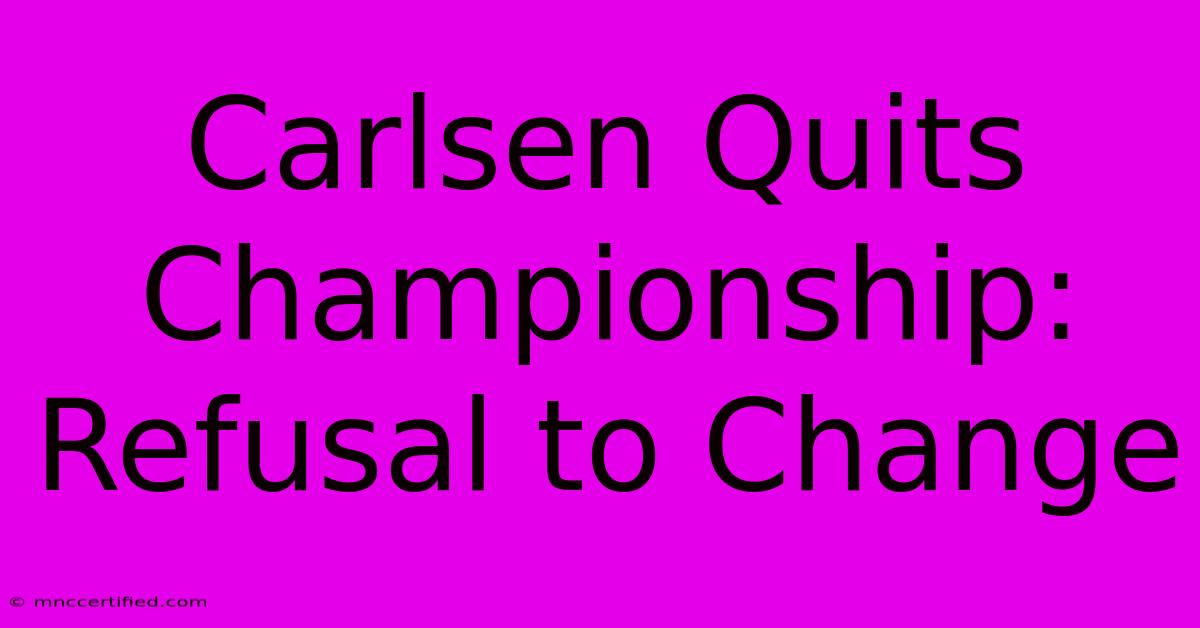Carlsen Quits Championship: Refusal To Change

Table of Contents
Carlsen Quits Championship: Refusal to Change – A Deep Dive into the Chess World's Shock
The chess world was sent into a frenzy when reigning world champion Magnus Carlsen announced his shocking decision to relinquish his title. This wasn't a graceful retirement; it was a pointed refusal to defend his crown, a bold move fueled by frustration and a desire for change within the sport. This article delves into the reasons behind Carlsen's controversial choice, examining the underlying issues within the professional chess landscape and exploring the potential consequences of his departure.
The Catalyst: A Pattern of Discontent
While Carlsen's official statement was relatively brief, the underlying discontent had been simmering for some time. His frustration wasn't about a single match or opponent, but rather a broader dissatisfaction with the current state of competitive chess. Several key factors contributed to his decision:
1. The Rise of "Novelty" Over Skill:
Carlsen has consistently voiced his concerns about the increasing prevalence of engine-assisted preparation and the resulting emphasis on novelty over fundamental chess understanding. He argues that this trend devalues deep strategic thinking and favors players who can exploit engine-generated lines, potentially leading to less engaging and less aesthetically pleasing games. This directly challenges the spirit of chess he cherishes.
2. The Lack of Excitement & Spectacle:
Many high-profile matches, even world championship contests, have felt less captivating than they should. The prevalence of draws, particularly in crucial games, has dampened the excitement for fans and players alike. Carlsen's frustration reflects a wider concern about making professional chess more engaging for a broader audience – a crucial aspect for the sport's continued growth. He feels the current format lacks the necessary spectacle to attract new fans and retain existing ones.
3. Ineffective Measures to Combat Cheating:
The ongoing struggle against cheating in professional chess, particularly with the rise of sophisticated engine-assisted methods, also played a role. While efforts are made to combat this issue, Carlsen felt the measures implemented were insufficient, potentially undermining the integrity of the game. This concern about fair play is a cornerstone of professional sportsmanship and a crucial aspect of Carlsen's decision.
The Implications of Carlsen's Departure
Carlsen's absence from future world championship matches will undoubtedly leave a significant void. His departure raises serious questions about:
- The Future of the World Championship: The loss of the reigning champion casts a shadow over the prestige and allure of the title. The upcoming championship cycle faces the significant challenge of attracting comparable viewership and interest. This necessitates a discussion on restructuring the tournament format to attract top talent.
- The Evolution of Chess Strategy: Carlsen's frustration with engine-driven strategies prompts a necessary conversation about how to balance technology's influence with the inherent strategic beauty of the game. This calls for the chess community to find new ways to emphasize classical strategic skill.
- The Sport's Appeal to Younger Generations: The declining viewership and engagement among younger generations necessitate a focus on making chess more accessible and exciting. Carlsen's departure highlights the urgency of these marketing and promotional efforts.
The Road Ahead: Necessary Changes
Carlsen's actions should be seen as a wake-up call for the chess world. His refusal to participate isn't merely an act of defiance; it's a powerful statement highlighting crucial issues that require immediate attention. The chess community needs to actively address these issues to ensure the long-term health and vibrancy of the sport. This means engaging in open discussions regarding tournament formats, cheating prevention, and promoting a style of play that prioritizes skill and strategic depth over mere novelty. The future of chess hinges on the community's response to Carlsen's bold move. Only by embracing meaningful change can chess hope to maintain its status as a captivating and intellectually stimulating game for generations to come.

Thank you for visiting our website wich cover about Carlsen Quits Championship: Refusal To Change. We hope the information provided has been useful to you. Feel free to contact us if you have any questions or need further assistance. See you next time and dont miss to bookmark.
Featured Posts
-
Injury Forces Schefflers Tournament Exit
Dec 29, 2024
-
Real Madrids Interest In Arnold
Dec 29, 2024
-
The Corbin Burnes Deal Explained
Dec 29, 2024
-
Jeju Air Crash A South Korean Tragedy
Dec 29, 2024
-
Littler Vs White World Darts Championship
Dec 29, 2024